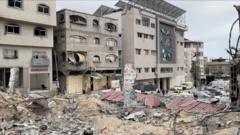The last hospital providing health services in the North Gaza governorate is out of service after the Israeli military ordered its immediate evacuation, the hospital’s director has said.
Dr Mohammed Salha said patients were evacuated from al-Awda hospital in Jabalia on Thursday evening.
He told the BBC “we are feeling really bad about this forced evacuation” after “two weeks of siege”, saying there is now “no health facility working in the north”.
Israel has not yet commented, but the BBC has contacted the Israeli Defense Forces (IDF).
“We’re really sad that we evacuated the hospital, but the Israeli occupation forces threatened us that if we didn’t evacuate, they would enter and kill whoever is inside,” Dr Salha said in a voice note to the BBC.
“Or they would bomb the hospital. We were thinking of the lives of patients and our staff.”
Dr Salha told the BBC the hospital faced “a lot of bombing and shooting from the tanks” from around noon local time (09:00 GMT) on Thursday.
He received a call from the Israeli forces at about 13:00 to evacuate, and initially refused because there were patients in need of healthcare. He offered to stay with another 10 of his staff and evacuate the others, but the military refused, he said.
After seven hours of negotiations, the evacuation occurred at about 20:30.
Staff carried patients more than 300 metres (984 feet) to ambulances parked far away from the hospital “because the roads are totally destroyed”.
A video sent by Dr Salha of the evacuation, and verified by the BBC, shows a line of ambulances with lights and sirens on driving at night.
“Due to impassable roads” the hospital’s medical equipment could not be relocated, the World Health Organization (WHO) said.
UN humanitarian agency OCHA said on Thursday “ongoing hostilities over the past two weeks have damaged the hospital, disrupted access, and created panic, deterring people from seeking care”.
Patients were evacuated to al-Shifa hospital in Gaza City.
Dr Salha told the BBC they would provide services through a primary health centre in Gaza City and said another might be established in a shelter.
Tedros Adhanom Ghebreyesus, director-general of the WHO, said the closure of al-Awda meant there was no remaining functioning hospital in the North Gaza governorate, “severing a critical lifeline for the people there”.
“WHO pleads for the hospital’s protection and staff and patients’ safety, and reiterates its call for the active protection of civilians and healthcare,” he said. “Hospitals must never be attacked or militarized.”
The IDF had ordered evacuations of the areas of Al-Atatra, Jabalia Al-Balad, Shujaiya, Al-Daraj and Al-Zeitoun on Thursday evening, spokesperson Avichay Adraee said at the time on social media.
“Terrorist organisations continue their subversive activity in the region, and therefore the IDF will expand its offensive activity in the areas where you are present to destroy the capabilities of the terrorist organisations,” he said.
“From this moment on, the mentioned areas will be considered dangerous combat.”
Al-Awda hospital was inside an evacuation zone announced last week, but had still been functioning, its director previously said.
A statement from 18 charities on Thursday said the hospital was under military besiegement “for the fourth time since October 2023 and has been struck at least 28 times”.
The emergency room was hit, injuring four staff, and the desalination plant and storage unit also struck, leading to the loss of all medicine, supplies and equipment, the charities said.
The IDF told the BBC last week it was “operating in the area against terror targets”, but that it was “not aware of any siege on the hospital itself”.
Apart from hospitals, some primary healthcare centres are still operating in Gaza, with 61 out of 158 partially or fully functional as of 18 May, OCHA said.
Nine out of 27 UN Palestinian refugee agency health centres were also functioning.
OCHA did not report how many, if any, centres were in the north Gaza governorate.
Israel is continuing its bombardment of Gaza, which most Palestinians are not currently able to leave, after a brief ceasefire earlier this year.
Israel began to allow a limited amount of aid into Gaza last week, after a nearly three-month blockade that halted the delivery of supplies including food, medicine, fuel and shelter.
Security broke down and looting took place as Palestinians searched for food in Gaza City on Thursday.
Scenes of chaos have also broken out at aid distribution centres run by the Gaza Humanitarian Foundation – a US-and Israeli-backed group.
The UN and many aid groups have refused to co-operate with the GHF’s plans, which they say contradict humanitarian principles and appear to “weaponise aid”.
Israel said it imposed the blockade on Gaza to pressurise Hamas to release the remaining hostages, at least 20 of whom are believed to be alive. It has also accused Hamas of stealing aid, which the group denies.
A UN-backed assessment this month said Gaza’s 2.1 million people were at a “critical risk” of famine. The UN’s humanitarian chief Tom Fletcher told the BBC people in the territory were being subjected to “forced starvation” by Israel.
Israel launched a military campaign in Gaza in response to Hamas’s cross-border attack on 7 October 2023, in which about 1,200 people were killed and 251 others were taken hostage.
At least 54,249 people have been killed in Gaza since then, including 3,986 since Israel resumed its offensive on 18 March, according to the territory’s Hamas-run health ministry.
Additional reporting by Naomi Scherbel-Ball and Alice Cuddy in Jerusalem







